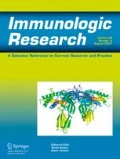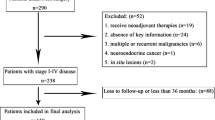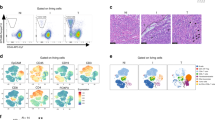Abstract
Tumor-draining lymph nodes (TDLNs) are critical organs, where activation of B cells and T cells is orchestrated. Effector or regulatory anti-tumor immune responses are reflected by the composition of the lymphocytic and monocytic cell population of the node. Aside from the migratory cancer cell abilities, immune cell phenotypic changes in the TDLNs may define nodal invasion by cancer. We assessed the qualitative and quantitative differences between lymphocytic phenotypes in regional TDLNs, in 20 node-negative and 20 node-positive patients (involved and uninvolved nodes) with rectal adenocarcinomas. Benign reactive nodes were also analyzed. CD8+ cells, the main source of cytotoxic T cells, were increased in all TDLNs and, even stronger, in the involved nodes. The percentage of CD4+ cells were significantly increased in negative and uninvolved nodes, while the CD4/CD8 ratio was significantly lower in involved TDLNs. CD25+ and FOXP3+ regulatory lymphocytes, however, prevailed in involved nodes, while uninvolved and negative nodes had a low presence of these regulatory cells. CD20+ B cells were also more abundant in involved nodes. PD-1+ lymphocytes were localized in the germinal centers. A significantly lower percentage of PD-1+ lymphocytes were noted in involved nodes. The development of a regulatory lymphocytic phenotype in the TDLNs appears as an important mechanism that allows cancer cell installation into the nodal environment. As negative/uninvolved TDLNs had a less severe immunosuppression, it is postulated that secreted molecules by cancer cells gradually attenuate the anti-tumor defenses of the TDLNs allowing the subsequent intra-nodal growth of cancer.




Similar content being viewed by others
Data availability
All data reported in the study are available in our Departments.
References
Chandrasekaran S, King MR. Microenvironment of tumor-draining lymph nodes: opportunities for liposome-based targeted therapy. Int J Mol Sci. 2014;15:20209–39. https://doi.org/10.3390/ijms151120209.
Hugues S, Fetler L, Bonifaz L, Helft J, Amblard F, Amigorena S. Distinct T cell dynamics in lymph nodes during the induction of tolerance and immunity. Nat Immunol. 2004;5:1235–42.
Itano AA, Jenkins MK. Antigen presentation to naive CD4 T cells in the lymph node. Nat Immunol. 2003;4:733–9.
Munn DH, Mellor AL. The tumor-draining lymph node as an immune-privileged site. Immunol Rev. 2006;213:146–58.
Cochran AJ, Huang RR, Lee J, Itakura E, Leong SP, Essner R. Tumour-induced immune modulation of sentinel lymph nodes. Nat Rev Immunol. 2006;6:659–70.
Koukourakis MI, Giatromanolaki A, Sivridis E, Simopoulos C, Gatter KC, Harris AL, et al. LYVE-1 immunohistochemical assessment of lymphangiogenesis in endometrial and lung cancer. J Clin Pathol. 2005;58:202–6.
Luckheeram RV, Zhou R, Verma AD, Xia B. CD4+T cells: differentiation and functions. Clin Dev Immunol. 2012;2012:925135–12. https://doi.org/10.1155/2012/925135.
Haanstra KG, van der Maas MJ, ‘tHart BA, Jonker M. Characterization of naturally occurring CD4+CD25+ regulatory T cells in rhesus monkeys. Transplantation. 2008;85:1185–92. https://doi.org/10.1097/TP.0b013e31816b15b9.
Togashi Y, Shitara K, Nishikawa H. Regulatory T cells in cancer immunosuppression - implications for anticancer therapy. Nat Rev Clin Oncol. 2019;16:356–71. https://doi.org/10.1038/s41571-019-0175-7.
Iwahori K. Cytotoxic CD8(+) lymphocytes in the tumor microenvironment. Adv Exp Med Biol. 2020;1224:53–62. https://doi.org/10.1007/978-3-030-35723-8_4.
Golay JT, Clark EA, Beverley PC. The CD20 (Bp35) antigen is involved in activation of B cells from the G0 to the G1 phase of the cell cycle. J Immunol. 1985;135:3795–801.
Ostrand-Rosenberg S, Horn LA, Haile ST. The programmed death-1 immune-suppressive pathway: barrier to antitumor immunity. J Immunol. 2014;193:3835–41. https://doi.org/10.4049/jimmunol.1401572.
Nitta T, Yagita H, Sato K, Okumura K. Involvement of CD56 (NKH-1/Leu-19antigen) as an adhesion molecule in natural killer-target cell interaction. J ExpMed. 1989;170:1757–61. https://doi.org/10.1084/jem.170.5.1757.
Pulford KA, Sipos A, Cordell JL, Stross WP, Mason DY. Distribution of the CD68 macrophage/myeloid associated antigen. Int Immunol. 1990;2:973–80. https://doi.org/10.1093/intimm/2.10.973.
Giatromanolaki A, Banham AH, Harris AL, Koukourakis MI. FOXP3 infiltrating lymphocyte density and PD-L1 expression in operable non-small cell lung carcinoma. Exp Lung Res. 2019;45:76–83. https://doi.org/10.1080/01902148.2019.1617371.
Olkhanud PB, Damdinsuren B, Bodogai M, Gress RE, Sen R, Wejksza K, et al. Tumor-evoked regulatory B cells promote breast cancer metastasis by converting resting CD4+ T cells to T-regulatory cells. Cancer Res. 2011 May 15;71:3505–15. https://doi.org/10.1158/0008-5472.CAN-10-4316.
Heeren AM, Rotman J, Stam AGM, Pocorni N, Gassama AA, Samuels S, et al. Efficacy of PD-1 blockade in cervical cancer is related to a CD8+FoxP3+CD25+ T-cell subset with operational effector functions despite high immune checkpoint levels. J Immunother Cancer. 2019;7:43. https://doi.org/10.1186/s40425-019-0526-z.
Fransen MF, Schoonderwoerd M, Knopf P, Camps MG, Hawinkels LJ, Kneilling M, et al. Tumor-draining lymph nodes are pivotal in PD-1/PD-L1 checkpoint therapy. JCI Insight. 2018;3(23):124507. https://doi.org/10.1172/jci.insight.124507.
Vahidi Y, Bagheri M, Ghaderi A, Faghih Z. CD8-positive memory T cells in tumor-draining lymph nodes of patients with breast cancer. BMC Cancer. 2020;20:257. https://doi.org/10.1186/s12885-020-6714-x.
Murthy V, Katzman DP, Tsay JJ, Bessich JL, Michaud GC, Rafeq S, et al. Tumor-draining lymph nodes demonstrate a suppressive immunophenotype in patients with non-small cell lung cancer assessed by endobronchial ultrasound-guided transbronchial needle aspiration: a pilot study. Lung Cancer. 2019;137:94–9. https://doi.org/10.1016/j.lungcan.2019.
Heeren AM, Koster BD, Samuels S, Ferns DM, Chondronasiou D, Kenter GG, et al. High and interrelated rates of PD-L1+CD14+ antigen-presenting cells and regulatory T cells mark the microenvironment of metastatic lymph nodes from patients with cervical cancer. Cancer Immunol Res. 2015;3:48–58. https://doi.org/10.1158/2326-6066.
Alonso R, Flament H, Lemoine S, Sedlik C, Bottasso E, Péguillet I, et al. Induction of anergic or regulatory tumor-specific CD4+ T cells in the tumor-draining lymph node. Nat Commun. 2018;9:2113. https://doi.org/10.1038/s41467-018-04524.
Niakan A, Faghih Z, Talei AR, Ghaderi A. Cytokine profile of CD4+CD25-FoxP3+ T cells in tumor-draining lymph nodes from patients with breast cancer. Mol Immunol. 2019;116:90–7. https://doi.org/10.1016/j.molimm.2019.10.007.
Norouzian M, Mehdipour F, Balouchi Anaraki S, Ashraf MJ, KhademiB GA. Atypical memory and regulatory B cell subsets in tumor draining lymph nodes of head and neck squamous cell carcinoma correlate with good prognostic factors. Head Neck Pathol. 2019. https://doi.org/10.1007/s12105-019-01095-.
McDaniel JR, Pero SC, Voss WN, Shukla GS, Sun Y, Schaetzle S, et al. Identification of tumor-reactive B cells and systemic IgG in breast cancer based on clonal frequency in the sentinel lymph node. Cancer Immunol Immunother. 2018;67:729–38. https://doi.org/10.1007/s00262-018-2123-2.
Lo JHM, Battaglin F, Soni S, Puccini A, Berger MD, Zhang W, et al. B cell and B cell-related pathways for novel cancer treatments. Cancer Treat Rev. 2019;73:10–9. https://doi.org/10.1016/j.ctrv.2018.12.001.
Moore DK, Loxton AG. Regulatory B lymphocytes: development and modulation of the host immune response during disease. Immunotherapy. 2019;11:691–704. https://doi.org/10.2217/imt-2018-0185.
Ye Q, Wang C, Xian J, Zhang M, Cao Y, Cao Y. Expression of programmed cell death protein 1 (PD-1) and indoleamine 2,3-dioxygenase (IDO) in the tumor microenvironment and in tumor-draining lymph nodes of breast cancer. Hum Pathol. 2018;75:81–90. https://doi.org/10.1016/j.humpath.2018.02.004.
Giatromanolaki A, Koukourakis IM, Balaska K, Mitrakas AG, Harris AL, Koukourakis MI. Programmed death-1 receptor (PD-1) and PD-ligand-1 (PD-L1) expression in non-small cell lung cancer and the immune-suppressive effect of anaerobic glycolysis. Med Oncol. 2019;36:76. https://doi.org/10.1007/s12032-019-1299-4.
Ren X, Wu H, Lu J, Zhang Y, Luo Y, Xu Q, et al. PD1 protein expression in tumor infiltrated lymphocytes rather than PDL1 in tumor cells predicts survival in triple-negative breast cancer. Cancer Biol Ther. 2018;19:373–80. https://doi.org/10.1080/15384047.2018.1423919.
Tachibana T, Onodera H, Tsuruyama T, Mori A, Nagayama S, Hiai H, et al. Increased intratumor Valpha24-positive natural killer T cells: a prognostic factor for primary colorectal carcinomas. Clin Cancer Res. 2005;11:7322–7. https://doi.org/10.1158/1078-0432.CCR-05-0877.
Li J, Li L, Li Y, Long Y, Zhao Q, Ouyang Y, et al. Tumor-associated macrophage infiltration and prognosis in colorectal cancer: systematic review and meta-analysis. Int J Color Dis. 2020 Apr 17;35:1203–10. https://doi.org/10.1007/s00384-020-03593-z.
Pinto ML, Rios E, Durães C, Ribeiro R, Machado JC, Mantovani A, et al. The two faces of tumor-associated macrophages and their clinical significance in colorectal cancer. Front Immunol. 2019;10:1875. https://doi.org/10.3389/fimmu.2019.01875.
Funding
The study has been financially supported by the Tumor and Angiogenesis Research Group.
Author information
Authors and Affiliations
Contributions
AG: Conception and design, analysis and interpretation of data, writing of the paper
IMK: Conception and design, analysis and interpretation of data, writing of the paper
PC: Immunohistochemistry assessment, writing of the paper
MaK: Acquisition of data, immunohistochemistry assessment, writing of the paper
KB: Performed the immunohistochemistry, writing of the paper
MIK: Conception and design, analysis and interpretation of data, writing of the paper
Corresponding author
Ethics declarations
Conflict of interest
The authors declare that they have no conflict of interest.
Ethics approval
For the conduct of the study, ethical approval was obtained from the Scientific Committee and the Ethics Research Committees of the University Hospital of Alexandroupolis (study approval number ES11-26-11-18). The patient informed consent was waived by the ethics board, as the study is based on archival material, and the anonymity of patients is guaranteed. The study was conducted according to the criteria set by the declaration of Helsinki.
Consent for publication
There are no individual person’s data included in the paper.
Additional information
Publisher’s note
Springer Nature remains neutral with regard to jurisdictional claims in published maps and institutional affiliations.
Rights and permissions
About this article
Cite this article
Giatromanolaki, A., Koukourakis, I.M., Chatzipantelis, P. et al. Rectal cancer induces a regulatory lymphocytic phenotype in the tumor-draining lymph nodes to promote cancer cell installation. Immunol Res 68, 363–372 (2020). https://doi.org/10.1007/s12026-020-09161-5
Received:
Accepted:
Published:
Issue Date:
DOI: https://doi.org/10.1007/s12026-020-09161-5




